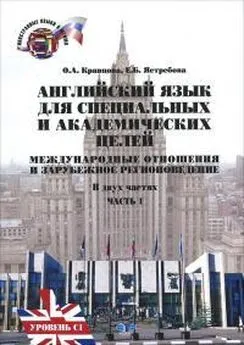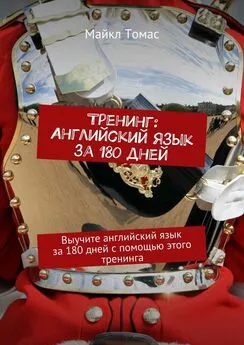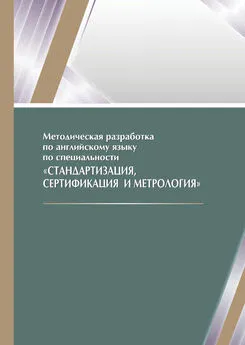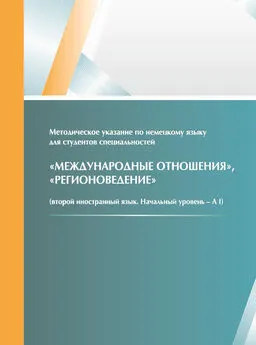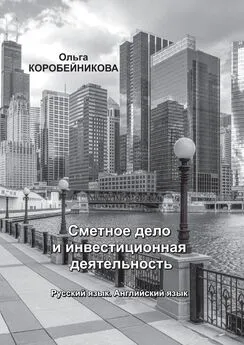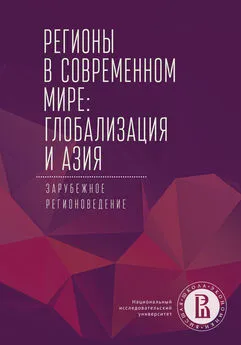Ольга Кравцова - Английский язык для специальных и академических целей: Международные отношения и зарубежное регионоведение. Часть 1
- Название:Английский язык для специальных и академических целей: Международные отношения и зарубежное регионоведение. Часть 1
- Автор:
- Жанр:
- Издательство:МГИМО-Университет
- Год:2015
- ISBN:978-5-9228-1210-8
- Рейтинг:
- Избранное:Добавить в избранное
-
Отзывы:
-
Ваша оценка:
Ольга Кравцова - Английский язык для специальных и академических целей: Международные отношения и зарубежное регионоведение. Часть 1 краткое содержание
Адресовано студентам четвертого курса факультетов и отделений международных отношений и зарубежного регионоведения.
Английский язык для специальных и академических целей: Международные отношения и зарубежное регионоведение. Часть 1 - читать онлайн бесплатно полную версию (весь текст целиком)
Интервал:
Закладка:
Loyalists decamped to Canada, which (like Europe) remained a more deferential, communal and paternalistic 28 28 Paternalism — a policy or practice of treating or governing people in a fatherly manner, especially by providing for their needs without giving them rights or responsibilities
society. But in America, the legitimacy of unchangeable social distinctions collapsed. Jefferson said that men would advance based on “virtue and talent,” and not on birth. The Revolution “made the interests and prosperity of ordinary people — their pursuit of happiness — the goal of society and government,” wrote Wood.
The resulting mind-set often means disappointment and division. All authority is suspect, because it elevates some over others and triggers an inbred distrust of “aristocracy” — now “elites” or callous CEOs. Popular culture is democratic and, therefore, sometimes shallow and offensive. Talk radio and trash TV are only new expressions of old impulses. Progress is never sufficient, because happiness — though constantly pursued — can never be guaranteed. Politicians fall short of the ideals that we (and they) set: one reason why we attack them even while admiring our system.
The election will expose these contradictions but not dispose of them. It's great to be an American, but we are burdened as well as blessed by our beliefs. That defines the American Drama.
1. Gallup poll — assessment of public opinion by questioning a representative sample of people, esp. in order to forecast voting at an election. Gallup polls are named after the American statistician, George Horace Gallup, who invented them.
2. Individualism — is closely allied to ideas of freedom. It encompasses a number of goals which individuals may wish to attain including maximizing personal opportunities, realizing one's potential, the fulfillment of aspirations, enjoyment of wealth, property and privacy as well as the security which results from a well-ordered and peaceful society, egalitarianism — political theory that all members of society have equal rights and should have equal treatment.
3. Welfare state — a term used to describe a national system when all citizens are required to contribute through taxation or other contributions to the provision of social services such as health, education, financial benefits, pensions, etc. These services are available to all according to need on a free or subsidised basis.
4. Alexis de Tocqueville (1805-1859 — French democratic theorist, author of De La Democratie en Amerique (Democracy in America) and De L'Ancien Regime, which set out nineteenth century liberal ideas. Tocqueville used the term “democracy” meaning a society where there
Unit II. US: from Democracy to Empire?
Unit II. US: from Democracy to Empire?
is social equality and an absence of class hierarchy and privilege. Over a century later, in the 1960s, Tocqueville's ideas on democracy were echoed in the sociological studies of American political scientists.
5. Colonial times. In 1765 British America was comprised of thirteen colonies which came under the jurisdiction of Parliament in London, and whose people were subjects of the King (George III at that time). Each of the colonies had its own political institutions, but these were relatively powerless, with no legislative and few executive powers.
6. Jefferson, Thomas (1743-1826) — US politician and 3rd President. A delegate to the Second Continental Congress (1775), he drafted the Declaration of Independence. Jefferson was Governor of Virginia (1779-1781), Minister to France (1785) and Secretary of State (1790). He served as Vice-President under John Adams (1797-1801) and as President (1801-1809).
7. The pursuit of happiness — a quote from the American Declaration of Independence. “We hold these truths to be self-evident, that all men are created equal, that they are endowed by their Creator with certain inalienable Rights, that among these are Life, Liberty and the Pursuit of Happiness” (American Declaration of Independence).
COMPREHENSION ASSIGNMENTS
1. The things that Americans venerate about America breed conditions that they despise.
2. The American Creed (the Americans' distinct set of values) has fired economic advance.
3. The emphasis on individual striving, success and liberty can inhibit social control and loosen people's sense of communal obligation.
4. Because Americans worship individual effort, they are more tolerant of failure and inequality than other nations.
5. To some extent, the proof that American virtues and vices are connected comes from abroad.
6. Even in Colonial times, America was less rigid socially than Europe. Land was a great leveler.
7. Colonial America brimmed with hereditary privileges and arbitrary power.
8. But in America, the legitimacy of unchangeable social distinction collapsed. Jefferson said that men would advance based on “virtue and talent” and not on birth.
9. The Revolution “made the interests and prosperity of ordinary people — their pursuit of happiness — the goal of society and government.”
10. Progress is never sufficient, because happiness — though constantly pursued — can never be guaranteed.
11. Popular culture is democratic and, therefore, sometimes shallow and offensive.
1. How does American patriotism compare with that of Europeans?
2. What is it about the American society that makes its citizens so proud of their country?
3. What features of their society do Americans despise?
4. Why, according to the author, is it important that Americans should see the connection between the two?
5. What achievements of the American society can be attributed to their national values?
6. What are the negative effects of individualism and striving for success on the American society?
7. What social changes in the countries that have recently acquired political freedom prove, in the author's opinion, his assumption?
8. In what historical conditions was the American national mindset shaped?
9. How can Americans' distrust of authorities be accounted for?
a) of the country you study
b) of Russia
c) of your native country
VOCABULARY PRACTICE 1

Unit II. US: from Democracy to Empire?
1. to help the growth or development of something
2. to respect deeply, regard as sacred
3. to produce or lead to (something) over a period of time
4. appropriate to the current time, period, or circumstances; of contemporary interest
5. to comprehend fully
6. to overwhelm with a large number or amount
7. to exist together as a combination
8. to attempt to repair or improve something in a casual or desultory way
9. an undertaking involving chance, risk, or danger
10. to prevent or slow down the activity or occurrence of (something)
11. to put (something or someone) in a dangerous situation
Unit II. US: from Democracy to Empire?
12. something that tends to reduce or eliminate differences among individuals
13. depending on individual discretion (as of a judge) and not fixed by law; not restrained or limited in the exercise of power
14. showing that you respect someone and want to treat them politely
15. the process of trying to achieve something
Ex. 2. Continue the strings of collocations, translate them. Make up a sentence with one collocation from each list.
Ex. 3. Fill in the gaps with the words from Ex. 1 and Ex. 2.
1. Railway Minister is unlikely _________________with basic passenger fares but may announce
some new trains and measures to improve services.
2. Sri Lankan officials claim that the UN investigation threatens to _______________ the
development of the island.
3. The Great Depression was a great________________ that reduced (social) differences in the
face of common want.
4. According to the author, democracy is not likely to come about unless leadership becomes _______________ to democratisation and governance reform.
5. __________________ decision-making by the powers that be is common in academia.
6. The ethnic, religious, and political diversity of the region has historically _____________
conflict.
7. The purpose of the visit is _______________ economic relations between the two countries,
especially in the field of agriculture.
8. Mary Wollstonecraft's work in ______________ of equality for women led to her being dubbed
the founder of the British Women's Rights Movement.
9. In fact, China was once at the centre of a regional security system, and other states had to conduct their relations with Beijing in a _________________ manner.
10. While Britain has been forced to worship at the altar of equality and _______________ the
values and beliefs of minorities, no-one noticed that the place was falling apart.
11. It was difficult ________________ the idea that a handful of revolutionaries had managed to
seize the entire Egyptian army.
12. Students who search for broad terms on the Internet can be _______________ by useless or
offensive information.
13. Government income redistribution thus not only lowers working individuals' incomes but also ________________ economic growth.
14. The essential problem is that the EU was founded as a political venture but quickly grew into a (promising) economic ____________________.
15. And George Bush has relentlessly promoted a cultural view of the world that _____________
_______ religiosity, patriotism, and uncritical obedience to government.
1. What is social mobility? What do you think the term “intergenerational vertical social mobility” implies?
2. To your knowledge, what countries have the highest social mobility?
3. What is the connection between social mobility and the American dream?
4. How do you think the US ranks in terms of social mobility?
By Niall Ferguson / June 26, 2013 — Newsweek (abridged) http://www.newsweek.com/2013/06/26/niall-ferguson-end-american-dream-237614.html
“The United States is where great things are possible.” Those are the words of Elon Musk, whose astonishing career illustrates that the American dream can still come true.
Читать дальшеИнтервал:
Закладка:
